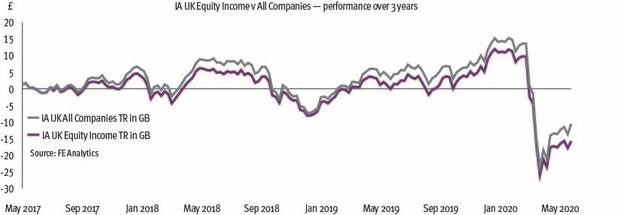
Equity income funds have long been cornerstones of the portfolios of advised clients in the UK.
However, years of stodgy performance from many funds in the IA Equity Income sector, and more recently the plethora of dividend cuts that have been announced by some of the biggest companies on the UK market, means investors are starting to question the role of such funds.
The problems for the sector go back many years, and initially centred on the requirement that funds in the Investment Association UK equity income sector must achieve a yield of at least 10 per cent more than the market as a whole.
This led to a situation where mandates that were among the sector’s best performers in total return terms, such as Evenlode Income, were removed from the sector as they did not achieve a high enough income.
That fund was removed in 2016. Funds run by Neil Woodford and his successor at Invesco were removed from the sector in 2014.
Key Points
- The equity income sector is under pressure
- UK companies in this sector are typically in more established sectors
- It is important to manage clients' expectations regarding dividends
Mr Woodford said at the time he believed his investors would much prefer him to achieve a higher total return and a lower income, than the reverse of that.
The IA subsequently reduced the yield target for funds in its equity income sector in 2017, stating that funds could remain in the sector as long as they at least matched the yield of the wider market.
Party of three
UK equity income funds are overly reliant on just three stocks to pay the bulk of the income they generate.
Among those stocks is Royal Dutch Shell, which this year cut its dividend for the first time since the second world war. UK banks have also been forbidden by their regulator from paying dividends this year.
Mark Preskett, portfolio manager at Morningstar, says he has “generally been moving away from UK equities, due to the narrow range of companies that pay dividends, and the sectors of the economy in which they operate”.
He notes that, unlike in the US, the largest companies in the UK market are not fast-growing technology businesses, but rather more traditional companies in sectors such as oil and banking, which risk being disrupted by technological change, rather than benefiting from it.
He says while the dividend outlook for those sectors will improve, he thinks it unlikely they will ever pay dividends at the levels they did prior to the crisis.
Mr Preskett prefers to invest in Japanese and US companies right now. He says the dividend yields are currently lower in those markets, but the income being generated is growing and the companies paying the dividends are in sectors benefiting from societal change.






